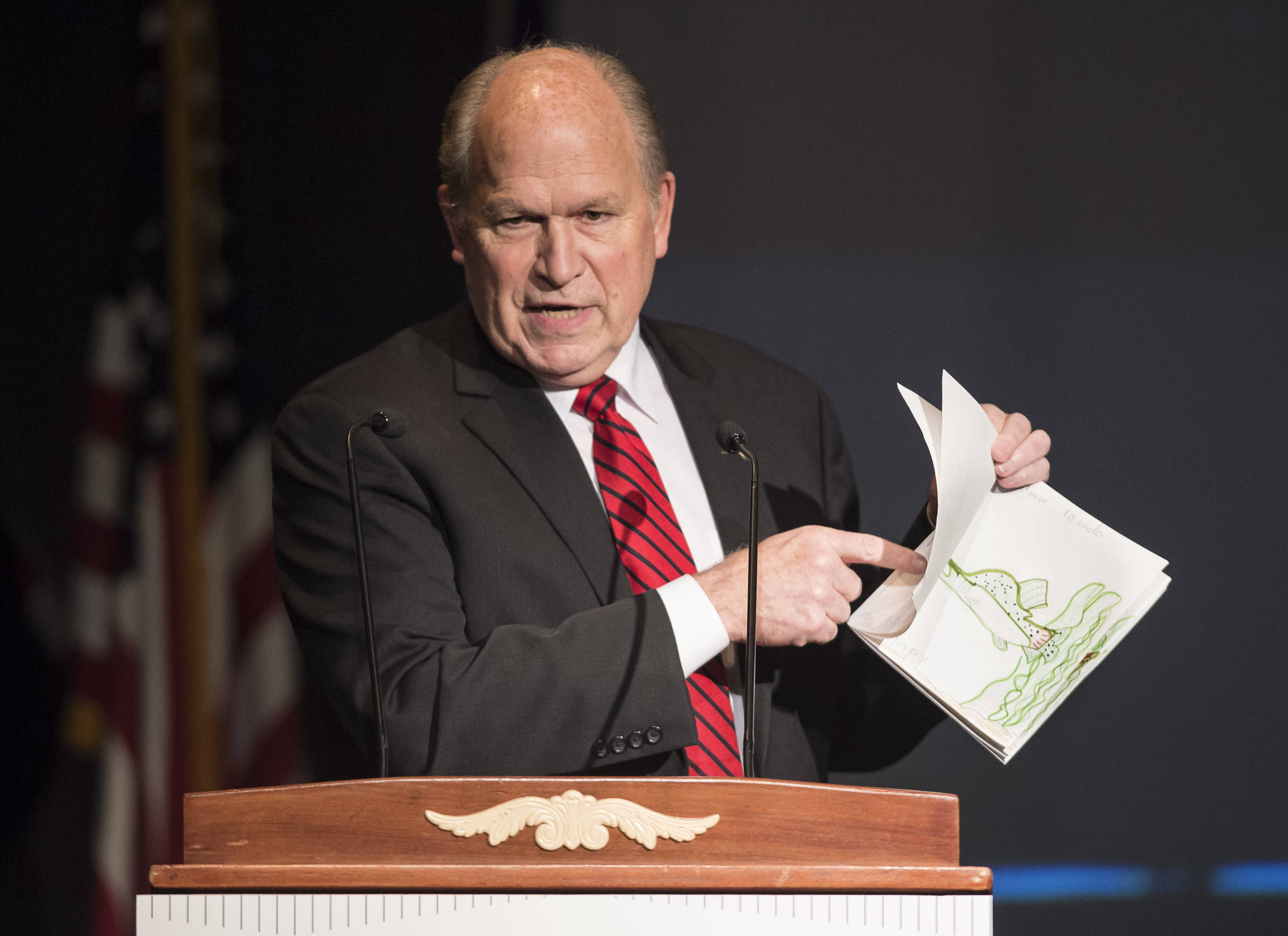Without a doubt, the Alaskan most disappointed by the Feb. 1 Morning Consult poll was Gov. Bill Walker. It ranked him the nation’s least popular governor seeking re-election. But there’s still nine months between now and Nov. 6. And to sincerely govern through the remaining legislative session requires he avoid confusing the job he was elected to do with campaigning for another four-year term.
It’s unlikely any sitting governor would get high approval ratings given the severity of Alaska’s fiscal situation. That aside, loyal Republican and Democrat party voters probably wouldn’t approve of Walker’s performance under any condition.
How did his opposition interpret the poll? Suzanne Downing, the GOP’s longtime spokeswoman, summed it up by pointing to Walker’s new tax proposals and his slicing the Permanent Fund dividend in half. Both of those were definitely factors. But because the pollsters revealed so little about their methodology, she’s overreaching to add his fixation on the gas line, position on oil tax issues, and a claim he’s ignored rising crime rates.
The Republican Governors Association piped in too. Going to the outer limits of rhetorical exaggeration, they called Walker’s record a story of “massive deficits, skyrocketing crime, and abysmal job growth.” It doesn’t matter to them that he inherited an economic mess. Or that crime in Alaska was nearly double the national average before he took office. They’ve written themselves a license to distort reality simply because Walker withdrew his party membership four years ago before dethroning the incumbent Republican.
That’s when the GOP’s tribal warfare against Walker began. The solid majorities in both houses became obstructionists on nearly every issue. It’s a legislative strategy meant to limit Walker to a single term that was taken from the Obama playbook written by Sen. Mitch McConnel of Kentucky. Senate President Pete Kelly, R-Fairbanks, continues to carry that party-before-the-people flag.
On the other side of the aisle, Democratic legislators and constituents haven’t always agreed with the Governor. But they’ve been genuinely open to compromise.
And they haven’t been in campaign attack mode because they don’t have a candidate lined up to run against Walker.
That may change, according to Anchorage Daily News columnist Charles Wohlforth. He first said Walker should consider running as a Democrat because he’ll lose if he remains an independent. It’s a conclusion based on the belief that the party will probably put a token candidate on the ballot who will take 10 percent of the vote away from Walker.
Wohlforth also reported that Rep. Tom Begich of Anchorage told him if Walker doesn’t get into the Democratic primary, he’ll encourage his younger brother, former Sen. Mark Begich, to run.
Both possibilities are music to Republican ears. They know Walker will lose a lot of independent voters if he’s no longer independent himself. And a GOP win is even more assured if he stays non-partisan and Begich takes the Democrats’ slot on the ballot.
All this is speculation though. What happens between now and the end of the legislative session will have a lot more bearing on how the race shapes up. And during the session, Walker should be focusing on governing, not the election. It’s what we want from all our elected officials.
Mike Dunleavy knows that. The week before the session started, he explained he couldn’t be a legislator and candidate for governor and do both well. So he resigned from the Senate to focus on the campaign.
The difficulty is more than choosing which act to do best. In the lead up to Election Day, empty campaign promises and misleading ads might be tolerated by voters. But it’s absolutely not in the public interest for those practices to be deceptively mingling alongside their official duties as incumbents.
These are valid reasons for voters to expect Rep. Mike Chennault, R- Nikiski, to either withdraw his candidacy for governor or follow Dunleavy’s lead by stepping down.
It’s also why Mark Begich should wait until the legislative session runs its course before making his decision. Entering the race sooner might make be a good campaign move. But prematurely pushing the governor into campaign mode isn’t in the best interest of Alaskans.
And for Walker the challenge is to keep the poll numbers and competing campaigns from rattling his ego and undermining his integrity.
• Rich Moniak is a Juneau resident and retired civil engineer with more than 25 years of experience working in the public sector. He contributes a regular “My Turn” to the Juneau Empire. My Turns and Letters to the Editor represent the view of the author, not the view of the Juneau Empire.

